When I was 20, I was a huge idealist. And a dreamer. I didn’t care for money at all. I thought it was the least important thing in the world. Passion was important, but not money.
After one year of university as an English major I dropped out and started a cafe. I’m pursuing my passion, I thought to myself, who the hell cares about profit?! This thought guided the (rather disastrous) way I ran the cafe. My startup capital was money I’d borrowed from my parents (since, as a student, I had zero savings). The cafe closed after less than two years.
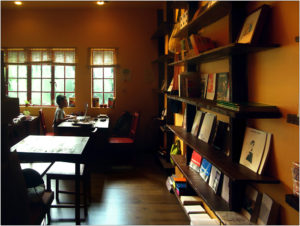
The cafe I started when I was 20
After the cafe closed I was adrift. I had projects I wanted to work on, things I wanted to pursue, places I wanted to travel to, business ideas I was excited about – in other words, I had dreams, but I had no money. With no money, I had no freedom to pursue any of these things. This was the first time I began to have an inkling of the relationship between money and freedom.
In the next few years that ensued, I hopped from one thing to the other, hoping to pursue my passions. For about six months I worked in a local arts organisation; I did freelance writing; I published a magazine; I started an online publication; I tried part-time radio deejay-ing. My passions could barely feed me. And I began to realise this: I wasn’t satisfied with being a starving creative. But I didn’t want to make money doing something that sucked the soul out of me either. I wanted to have the cake and eat it too. This was a big and important mindshift for me.
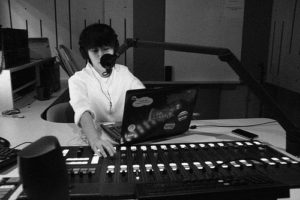
My part-time DJ days
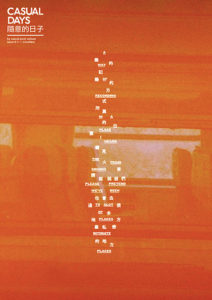
Casual Days, the magazine I published with $4,000 – made a loss on it
When I finally settled on the idea of becoming a photographer in 2012, it was after years of trying and failing repeatedly. Photography was something I’d always loved since I first picked up a camera when I was 17 or 18. But I hadn’t dared to dream that I could one day become a professional photographer. It felt too far away, like a distant land I could never reach. I had no idea how I could put a foot in the door of professional photography. But what did I have to lose? I had no money, no prospects (or it felt like that at the time, since I had dropped out and didn’t have a degree to my name). What I did have… was quite a bit of courage.
Everything clicked for me the moment I decided to become a photographer. An acquaintance that I’d met from my cafe days – who heard about this new move in my life – came out of nowhere and offered me my first well-paid photography job. He started the ball rolling for me, in a sense.
Luck played a big part too. I was entering the market at a time when the market was slowly shifting away from the kind of over-produced, over-glossy campaigns that have been popular for the longest time. Companies and brands wanted images that were authentic, intimate, and they wanted photographers who could bring something personal to their brands. My style was a good fit. If I had tried becoming a photographer ten years ago, when I was 20, I might not have made it (plus I sucked at photography then).
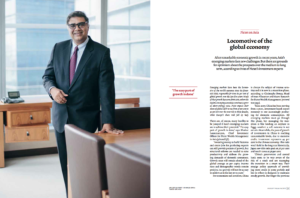
One of my first few jobs as a young and ignorant aspiring photographer – this was commissioned by Winkreative, the parent company of Monocle Magazine
My previous failures – the long road I’d taken – began to make sense.
Something else began to change too. For the first time in my life, I began making money. Because my skills were relatively valuable, I was paid a higher premium for it. And I wasn’t afraid to ask to be paid a premium, since I believed in my own value.
(Of course, before this could happen, I was teaching tuition for a year, shooting for my friends or friends of friends for free, taking up photoshoots that paid me $280 for 4 hours. Or $150 for 50 shots (over 3 hours). It was brutal.)
In a perfect world, we wouldn’t need money. We wouldn’t even need to learn about money and how it works. But in this world that we live in, we do. If you don’t, you will suffer. You will settle back into an unsatisfying desk job. Or you will settle for being a lowly-paid creative. Don’t settle.
As a creative, we all face the same problem of wanting to pursue our passions and wanting to live comfortably while doing it (unless you are content with being a hobo, then maybe this article isn’t for you). We must then learn to think about money in a way that can best serve us.
I am deeply passionate about this topic because I see too many of my friends and fellow creatives slaving away doing good work for little to no money. I want to change that.
My advice is this (and take it only if you think it makes sense): don’t work for too little money. It’s okay at the beginning, when you are starting out, but once you become sure of your skills, go out there and charge a premium for it. Don’t let other people exploit you and your talents. Believe in your own value, fight for what you are worth. Your belief in your own value is reflected in how much you charge for your services.
In fact, as a creative, in my opinion, the best thing you can do is become a freelancer. You can earn much more as a freelancer (than as an employee) if you play the cards right. It might take awhile, but you can easily earn more than the take-home pay of $2,000 a full time job pays you to be a marketing executive or a copywriter or an illustrator.
I know I am at risk of sounding like a money-grubber. I am not. I spent years dirt poor doing things I love. But I learnt to think of money as being important because it gives me options, the chance to work on passion projects, confidence, and freedom. Sweet, sweet freedom. And it allows me to pay it forward.
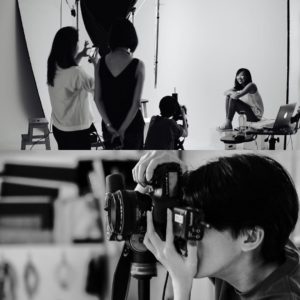
Recently: working on a passion project to photograph 100 others who were born in the year 1986
I will write more on this topic – and hopefully with more actionable steps – but for now, I wish you luck, and I hope that you will experience a mindshift that will help your passion to converge with profitability.
That’s when magic happens.
(I’d be happy to reply your emails about this topic if you want to write me. Email me at rebeccatohphoto[at]gmail.com)